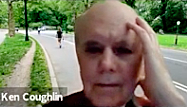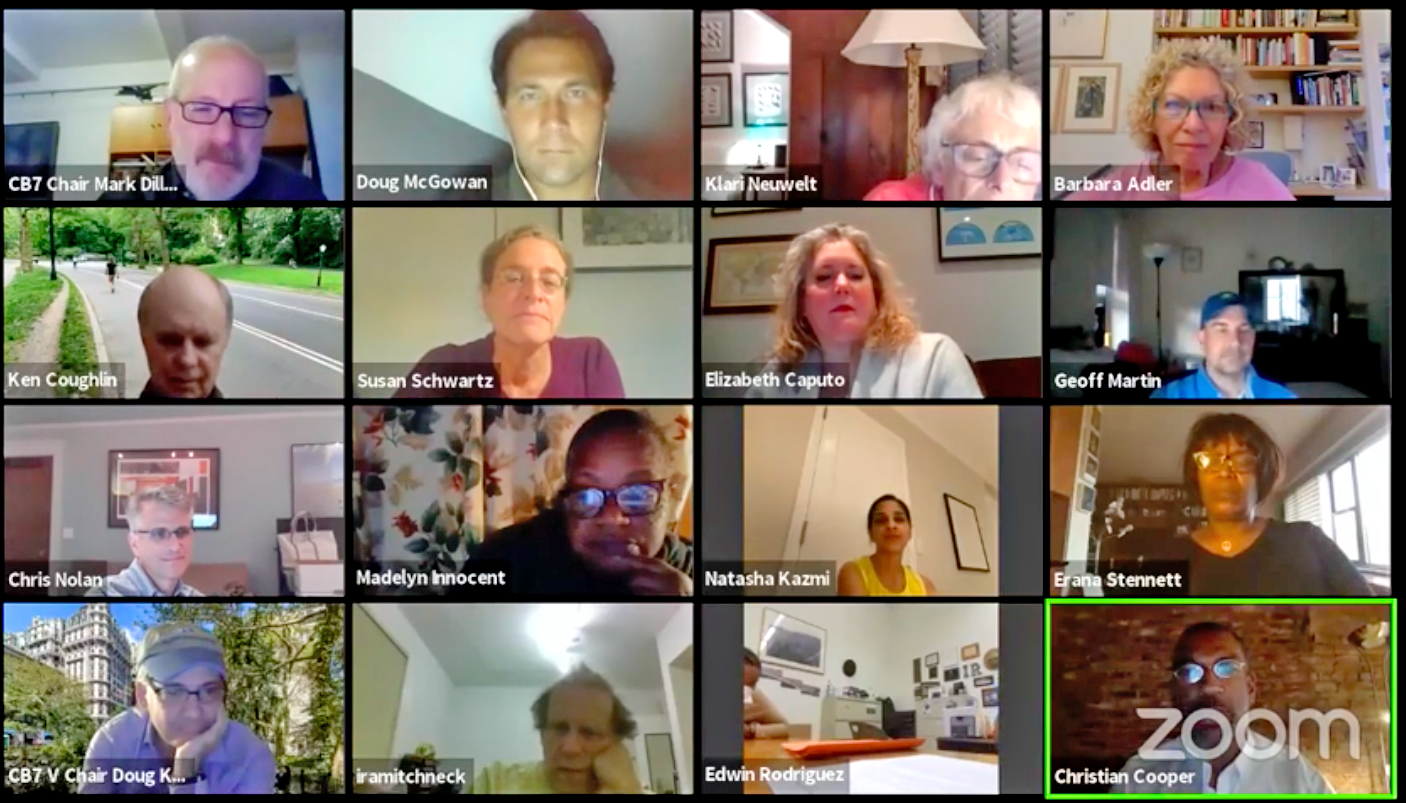An Upper West Side community panel has once again called for more NYPD enforcement in Central Park — and this time, it had the support of a prominent victim of the specter of police violence.
Community Board 7's Parks committee voted 7-1 on Tuesday night to ask the NYPD to step up its enforcement of dog-off-leash tickets — citing as motivation last month's incident when a white dog-walker threatened to call the cops on black bird-watcher Chris Cooper. That incident became such a flashpoint because the woman's call to the cops that “an African-American man [is] threatening my life” itself put the bird-watcher in danger. Statistics show that police stops are more likely to lead to harm to blacks than whites.
Nonetheless, Cooper testified via Zoom in favor of more police enforcement. [Video here; segment on enforcement begins at 1:50.]
"It's long overdue and I want to voice my full support for it, 100 percent," said Cooper. "This is not a race issue. It came about because of a race issue in this instance, but what it really was, up until that moment, was a conflict between a a birder and a dog-walker — and we've seen that way too much in the park. The conflicts would never have happened if only there had been some regular enforcement. So that's what we're asking for. I won't belabor it."
A member of the committee, Liz Caputo, thanked Cooper: "We appreciate what you've been going through and have been thinking of you."
But not everyone on the committee has been thinking of the issue of police enforcement in the same way as Caputo. Other participants on the call brought up what might have happened to Cooper if cops had indeed responded to dog-walker Amy Cooper's false report of a threatening a black man (the incident happened on Memorial Day — the same day that George Floyd was killed by a white cop in Minneapolis).

"The spirit of this resolution is fairly punitive calling for enforcement," said committee member Ken Coughlin. "As we know, the law is a very blunt instrument and it can be used very selectively and that can create great danger for some people. ... I am not in favor of something that uses the blunt instrument of the law, especially at this time."
Another speaker, Rich Robbins, said the resolution should be rewritten to exclude the Police Department in favor of Park Enforcement Police, who undergo different training and interact almost exclusively with park users. He called it "tone deaf" to call for more enforcement in the current climate.
Those calls were dismissed by committee member Susan Schwartz, who wrote the resolution at hand. She claimed that more enforcement is needed so that park users aren't at each other's throats.
"What I'm hoping to do by advocating enforcement is to take it out of the hands of the park users to try to adjudicate it for themselves," she said. "That's where you get the real risk and the real danger and the situation where somebody like Chris is at real risk of it escalating to a really dangerous situation."
Enforcement by police, she added "is a real improvement over park users doing it to each other."
Board member Erena Stennett agreed, pointing out that Cooper had come to a Community Board 7 meeting before his run-in with Amy Cooper to seek more enforcement of leash laws, a position he continues to support despite — or perhaps because of — everything that has happened over the past three weeks.
To Stennett and Schwartz, it remained an issue of ensuring that cops enforce the rules so that park users don't have similar incidents as Cooper vs. Cooper.
The difference is that random dog walkers in Central Park are almost never armed — and incidents involving one park user asking another park user to observe park rules don't typically turn fatal. But encounters between police and black Americans are fraught. Studies show that blacks and Latinos are much more likely to be roughed up by cops.
And beyond that, encounters between police and all people too often end in violence and death, as The Washington Post has reported.
Cooper's pro-enforcement testimony put him in the middle of a debate among privileged (and predominantly white) Upper West Siders. One camp used Cooper's testimony as evidence that no one need fear police enforcement. Members of the other camp seemed to discount Cooper's call for more enforcement — and, by doing so, risk the appearance that they know what's best for black park users.
The timing of the debate also can't be ignored: Over the past month, hundreds of thousands of New Yorkers have taken to the streets in support of the Black Lives Matter movement [full disclosure: this reporter has been among them]. Many marchers have voiced their desire for fewer cops. And, in press interviews, Cooper said he clearly sees the danger of police and civilian bias that stems from our nation's history of white supremacy.
“There are certain dark societal impulses that she, as a white woman, facing in a conflict with a black man, that she thought she could marshal to her advantage,” Cooper told the Times this week. “She went there.”
Cooper's sister Melody added that she had "no doubt that if the police had showed up in the Ramble ... my brother’s Ivy League degree and impressive résumé would not have protected him,” she wrote in a Times op-ed on May 31.
(Neither Chris nor Melody Cooper responded to messages left by Streetsblog.)
After the meeting, Manhattan Borough President Gale Brewer — who is also white and a professed supporter of the Black Lives Matter movement — told Streetsblog, "I absolutely do not want the NYPD to do" the dog-leash enforcement.
"PEP officers have ways of working with park users and dog owners, but this is an example of where the cops don't know how to do it in a way that is effective," she added. "So, no, I don't want the NYPD to do it."
Brewer declined to comment on whether she as a white person in power should neglect testimony by Cooper — who was himself a victim of racist profiling. For his part, Coughlin said he was comfortable taking his position because a community board in a famously liberal corner of New York — a board that has, in fact, expressed support for the Black Lives Matter movement — should not be on record calling for more cops when reducing enforcement by armed police is a central message of the Black Lives Matter movement.
"They apparently can only conceive of a punitive, law-and-order response to park violations," he said. "There's a long list of black lives that have been lost following police interactions that began with very minor alleged infractions. Rather than invite armed police officers into the Ramble to issue criminal summonses, it might make more sense to have a little patience and understanding, which we are all being called on to do during this extraordinary time."
Summonses issued by police officers are criminal matters, Coughlin added.
"Are we aware of what's going on in the outside world?" he said, citing the larger matters being protested on the streets. "I don't think we should be calling for criminal summonses in Central Park for an off-leash dog."
Lisa Orman of Streetopia UWS believes the debate exposes "just how privileged this committee is."
"PEP officers could easily do this job, focusing on education instead of strictly enforcing the park rules," Orman said. "Instead, one committee member said that she 'assumes NYPD will do the right thing.' Isn't that exactly what we don't think NYPD does? Isn't that why people were so horrified that Amy Cooper called the police? We can wish and hope that NYPD does the right thing — but to assume cops will shows how out-of-touch this committee really is."
It's the second time in a month that CB7 members praised the Black Lives Matter movement only to turn around minutes later and call for something that members of that movement would find abhorrent. Earlier this month, the full board passed a resolution calling for more NYPD enforcement against cyclists in Central Park — a resolution that Coughlin and others also called out for hypocrisy and danger to the black community.






